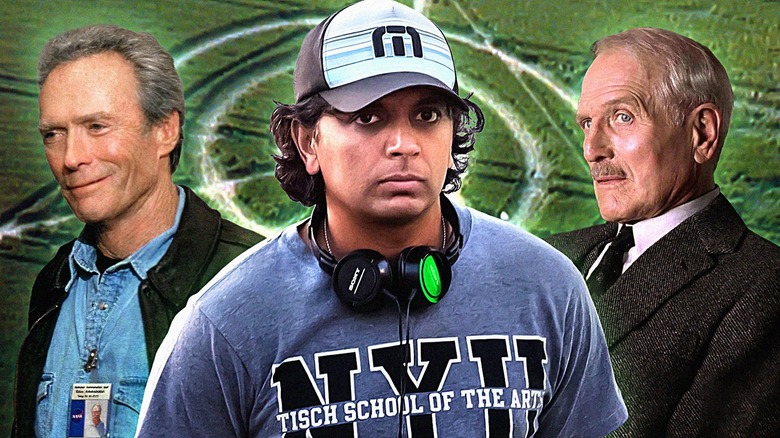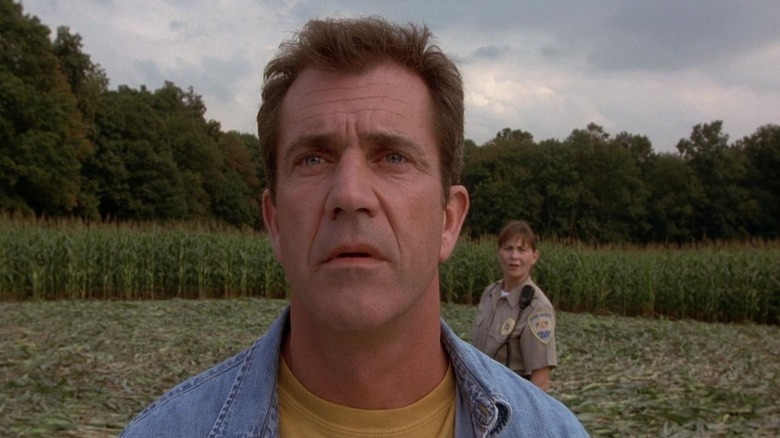Clint Eastwood And Paul Newman Declined Roles In This M. Night Shyamalan Classic
This post contains spoilers for “Signs.”
For me, “Signs” is the ultimate M. Night Shyamalan cinematic experience, and it has only gotten better with time. Before the film’s 2002 release, Shyamalan had already proven his caliber as an up-and-coming filmmaker with “The Sixth Sense” and “Unbreakable” — two entries that still live up to their fame — but “Signs” solidified his ability to shock, mesmerize, and entertain. Popular discourse surrounding “Signs” often revolves around its final twist, but this sci-fi thriller flick offers much more than that; it is a dynamic exploration of apprehension and anxieties that culminate in an event that could lead to the end of the world.
Shyamalan invests the alien invasion premise with an empathetic focal point in the form of the Hess family, as we are privy to every doubt, toil, and crisis they undergo while the film inches towards its exhilarating climax. Graham (Mel Gibson), a pastor struggling with his faith after the death of his wife, is barely able to function, let alone be there for his kids Morgan (Rory Culkin) and Bo (Abigail Breslin). The kids’ uncle, Merrill (Joaquin Phoenix), who has moved in to support the family and help them process their grief, emerges as a sort of welcome respite, yet portends of doom manifest in the form of ominous crop circles and worldwide sightings of strange events. Can faith, or the absence of it, help an ordinary family to make it out alive, especially when they’re already grieving?
“Signs” answers this question in a simple yet endearing way, weaving the fabric of the restoration of faith via miracle, but the lingering effect does not feel contrived or pretentious. Of course, the onus of selling such a tidy, cathartic resolution fell on the central cast, especially Gibson and Phoenix, whose characters are actively responsible for navigating such an impossible situation (for the sake of the children). They do, and remarkably so.
However, the role of Graham was declined by two popular actors before it ultimately went to Gibson. Here’s what happened.
Shyamalan initially wanted an older actor to play Graham Hess in Signs
Shyamalan had originally intended for Graham Hess to be an older man struggling with his faith — someone whose inner tussle between hopeful belief and pragmatic realism was reflected in his “haunted eyes,” as the filmmaker put it in an interview with Ain’t It Cool News in 2001. While any actor worth their salt could have fit the bill, Shyamalan had his sights set on Clint Eastwood, who is no stranger to playing slightly aloof, deeply complicated figures with a sense of concealed vulnerability, and naturally excels in that kind of role. However, at the time, Eastwood had moved away from acting, so this casting was not meant to be. After this, Shyamalan’s second choice for such an outwardly conflicted character was Paul Newman, but the actor declined due to a lack of interest.
After Gibson landed the role, however, Shyamalan changed up the Graham character a bit, making him 20 years younger and shifting the source of his grief and rage considerably, as he was now a middle-aged priest having an acute crisis of faith. Graham, however, cannot escape his associations with the church or divinity; no matter where he goes, people still address him as “Father,” and even attempts to comfort his kids results in an unexpected run-in with the person who accidentally killed his wife (played by Shyamalan himself). This, compounded with the fact that anxieties surrounding an inevitable alien invasion are at an all-time high in the film, contributes to the presence of a parental figure who is both put-together and broken — someone is who desperately trying (and failing) to be the person he is expected to be. Gibson embodies this dual sentiment perfectly, embracing bleak inevitability one moment and grasping onto hope the next.
“There is no one watching us, Merrill. We are all alone,” Graham states during a pivotal scene, and this sentiment feels almost true when the Hesses are backed into a corner and forced to fight the aliens with whatever is available inside their home. However, after Merrill swings that bat and Morgan’s life is saved in a way that Graham can only attribute to divine intervention, he becomes a changed man. Although grief still clings to him, his eyes no longer seem so haunted.
















Post Comment